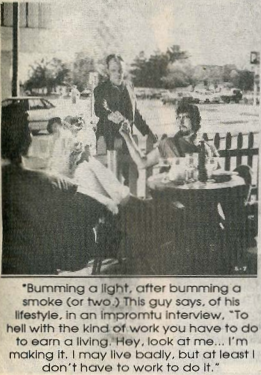Movie Reviews: October 1991
Film

Slacker (Slak’er), noun 1. a person who evades duties and responsibilities; 2. a new generation of young people, primarily centered around college campuses, that rejects the values of the generation before them, but hasn’t come up with anything much better; 3. the title of a film directed by Richard Linklater.
Are you a slacker? Would you like to be a slacker, but have too many responsibilities? Do you dislike slackers, feeling that they are just lazy weirdos? IF you answered “yes” (or “no”) to any of these questions, you obviously care enough about the subject to at least check out Richard Linklater’s singularly charming film.
Slacker begins with a monologue by Linklater as a new arrival, right of the bus, to Austin, Texas. He explains, to a (seemingly) disinterested cable what is, in essence, a crash course in the many worlds interpretation of quantum physics, which states that everything that we do spontaneously splits into a myriad (some say infinite) number of parallel “universes,” but we only experience one perspective because “we’re kind of trapped in this one reality restriction type of thing.”
Ambiguity abounds with extreme and subtle degrees of comedy, drama and satire. It’s up to the viewer, however, to decide what is serious and what is not in this strange and wonderful film.
For example: an interesting enigmatic fellow overhears that this guy’s friend is “missing” and matter-of-factly offers his explanation, “It’s all perfectly obvious.” The conspiracy behind the government is deceiving the general public about our space program and the greenhouse effect scientist who are disappearing and “mysteriously” dying are being recruited and ordinary people “people just like you and me” are being abducted and lobotomized to assist mindlessly on the government’s secret plot. He just thought the guy had a right to know.<br>
A cast of friends, musicians, people of the street, and a handful of professional actors portray the neurotics, losers, philosophers and other casualties of modern life, loosely termed as slackers, who are the next generation of hippies and yippies the antithesis of the preppie/yuppie culture; the neo-beatniks.
The different opinions of what’s going on in the world, dramatized/parodied through the eyes of anarchists, apathists and conformists. Freemasonry, Kennedy assassination theories, political and social deriding, hot cars, movies, television, modern art, music and Madonna’s pap smear are among the diverse subject matter covered in the course of the film, which in ninety-seven minutes, spans a twenty four hour period.
Slacker is a “study of communication,” says writer, director, producer Richard Linklater. Human beings with their different perspectives of the condition of life, expressing themselves, involved in discourse, bullshitting and theorizing, “Elvis is still alive…and if the guys half-assed cool, he’s like, an Elvis impersonator.” Endurance of life is stressed; suffering and surviving and actualizing personal growth through the strangeness of daily life.
Linklater’s cinematography conveys the feel of consciousness—it’s no “neat,” with the symmetrical syntax typical of mainstream movies. There are no central characters, no central plot, other than the theme of slackers slacking. “I think everyone does want to connect,” concludes Linklater, twenty-eight year old college dropout and self taught filmmaker, about his nineteen ninety nine release, which has received accolades at several international, independent film festivals.
This highly provocative, intelligent creations is an enjoyable experience, kind of like hanging out with your friends, especially if they happen to be slackers.
Nick Cave And The Bad Seeds
The Road That God Knows Where
Filmed in glorious black and white, The Road To God Knows Where is more for the longtime Nick Cave fan than those unfamiliar with this dark Orpheus. Definitely a treat for this worshipers, the video is an intimate look “behind the scenes” at a man whose reputation has reached epic proportions in the world of underground music. The film spans the length of the Tender Pray tour as Cave, accompanied by his bandmates The Bad Seeds, takes on the American music scene, Leaving a trail of disembodied spirits in its wake.
The film is a series of clips of the long bus rides, frustrating sound checks, backstage shenanigans and live performances mixed with long looks at Cave, the man, disrobed of his mysticism and appearing startling human and vulnerable to his fans. The monotony of your life shines through as well as the thrill of performing and building up more appreciation for the less well known music troupe.
The camera captures Cave, alone at the piano, working out songs that have appeared on The Good Son LP. There are also pieces where Cave talks to interviewers and opens up about his musical influences and personal feelings about his music, relating his fascination for the “Southern white-trash” character that appears so often in his songs and in his recent book. The sound checks also provide insight into Cave’s influences as he works his way through versions of “Fever” and his own immortal version of “By The Time I Get To Phoenix.”
The black and white cinematography gives the feeling that the ghosts of Cave’s many characters are lurking in the shadows, home at last in their native America, and possibly, at peace with themselves at long last.
By the end of the film you can feel the anticipation for the time when the band is done with their stint in America and can return home to a short break before they re-enter the studio. A tired looking Cave with his worn-out Bad Seed bids farewell to America and lays to rest a well played series of shows.
Added to the film are videos of Cave performing such songs as “In The Ghetto,” “The Mercy Seat” and “The Singer.”
After traveling down The Road To God Knows Where with Nick Cave and the Bad Seeds, I’m feeling better acquainted with one of my personal music heroes, having taken part in his journey and also seen the actual tour a couple years ago.
Long Live King Ink!
For more from the SLUG Archives:
